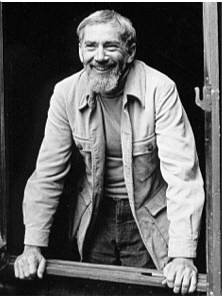1925–1996
In 1970, Wallace Stegner wrote in Life Magazine: “The Subversive Science is subversive not in its approach but in its substance. In essays by archeologists, anthropologists, biologists, landscape architects, philosophers, historians and demographers, it relates man to his origins, his technical advancement, his earth, his fellow creatures….But the sobriety of the writing, the distinction of many of the contributors, the fact that the book is no product of recent panic, but the gleanings of 40 years of intelligent concern for the environment, make it, as its general editor, Starker Leopold says, ‘frightening.’ This civilization has been set for centuries on a suicide course.”
Barry Lopez wrote, “Much of what we value in contemporary thought about ‘nature and culture’ grew up in the seedbed of Paul Shepard’s thinking. He writes with freshness and an almost angry brilliance, as though he had grasped the psychological need for natural ecosystems at the same moment they were disappearing from an industrial world.” Peter Matthiessen called him, “An exceptionally clear thinker who is also a lucid and exhilarating writer….His work is valuable but very urgent, shining in the sun like the tip of a vast iceberg of knowledge and reflection that supports it.”
As a pioneer of the ecology movement, a teacher who inspired generations of students and colleagues, and a scholar and writer whose work continues to grow in influence, Paul Shepard’s profound contribution to our understanding of what it means to be human–especially in relation to other animals and our evolutionary past, but also to our culture and to each other–is central to his public legacy.
It is there in the title of his influential 1969 essay, “Ecology and Man–A Viewpoint,” a clarion call that provided the fledgling ecology movement with a profound and timeless challenge. It is there in the title of his first book, Man in the Landscape. It became official in 1973 when Paul Shepard became Avery Professor of Natural Philosophy and Human Ecology at Pitzer College and the Claremont Graduate School, the first to hold a chair in human ecology anywhere. “No one before,” wrote Jack Turner in an introduction to one of Shepard’s last books, “had looked at the relations between the human mind, its habitat, and other species. It seems Homo sapiens had little interest in applying the ideas of ecology to itself.” Indeed, as Turner concludes, by the end of his tenure at Pitzer, “Shepard had put human ecology on the intellectual map.”
But the effect was more than intellectual. Shepard and his work affected people deeply, viscerally, emotionally, and permanently. His ideas changed world views and re-oriented careers; he changed lives.
When he died in 1996 few of his books were in print. Today nearly all of them are back in print. A flood of new research and new books by others build on his insights, on such subjects as childhood and nature, the importance of place, humanity’s physical and cultural characteristics developed in the Pleistocene hunter-gatherer period, the shaping of civilization and history by the structures of large-scale agriculture, and many others. But only in his work are these subjects brought together in coherent and revelatory relationship to tell the story of the human past, the earth’s present, and what is crucial to the future of both. His work will always be relevant and essential.
–Adapted from an earlier introduction by William Severini Kowinski and Florence Shepard

